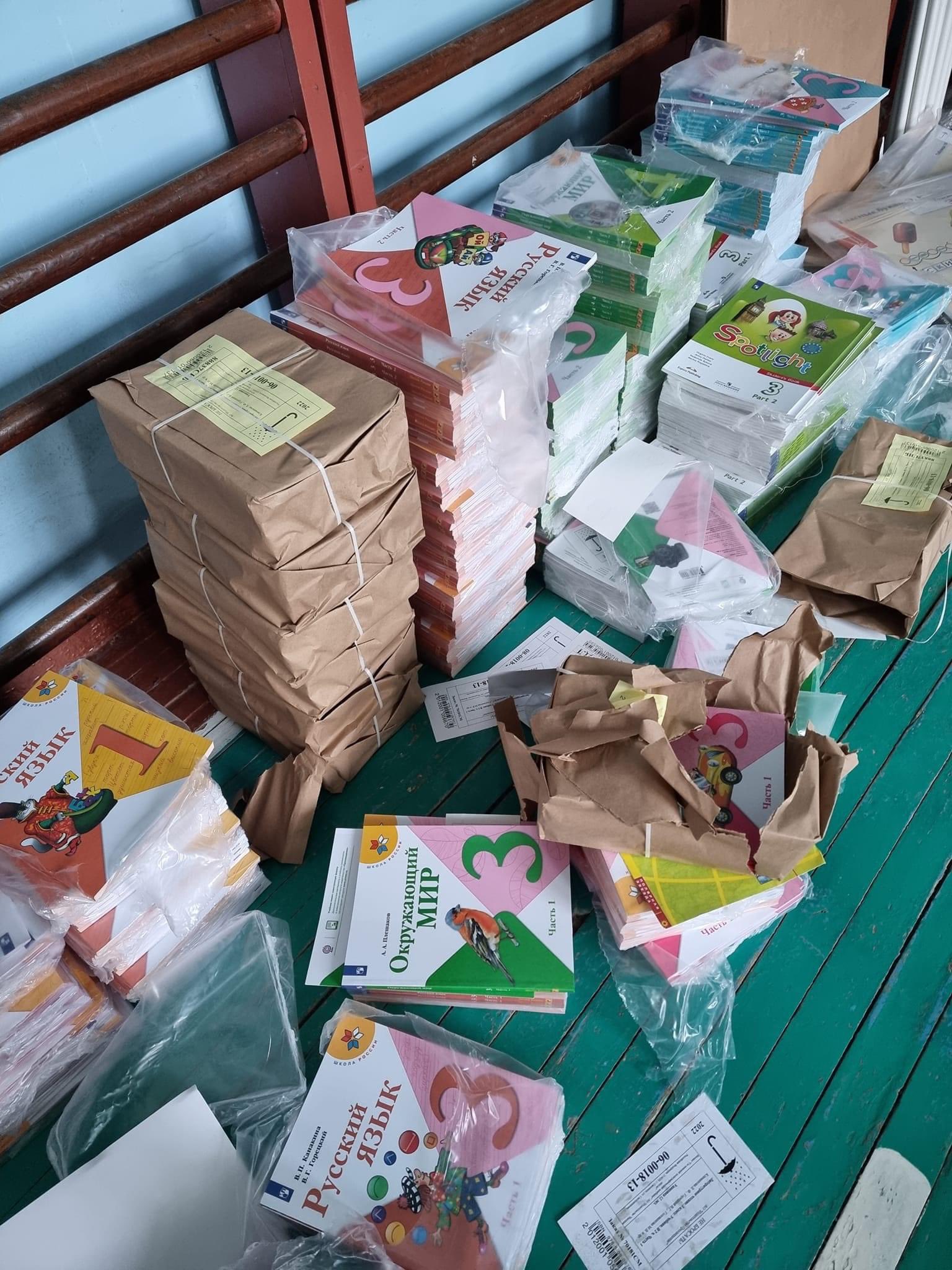From the start, there were already indications that Russia was trying to eradicate the Ukrainian culture in the occupied territories. After the liberation of several regions in September, evidence is mounting that this plan for culturicide was systematically implemented by the Russian occupying forces.

Russian schoolbooks, delivered by Russian government to Ukrainian schools in occupied territory. Source Oleg Golovkov
By Halya Coynash
Documents uncovered after the Ukrainian Armed Forces liberated Balakliya (Kharkiv oblast) show how the occupation regime swiftly took steps to remove the Ukrainian language and literature from schools.
This is further confirmation that Russia’s war is not aimed, as Russian leader Vladimir Putin claimed, at ‘the demilitarization and denazification of Ukraine’. As journalist Denis Kazansky points out, it is proof of Russia’s ‘policy of genocide’, its wish to eliminate all that represents Ukrainian identity.
Kazansky posted two documents from so-called ‘commissions’, made up of individuals willing to collaborate with the Russian invaders. Both are entitled ‘On the removal of literature’, with one from 12 August, the other from 18 August. Each indicates the number of textbooks from primary and secondary classes being removed, together with ‘Ukrainian symbols’ like literature (works of fiction), posters, stands, signs (over the school, etc.) and school documentation.
Kazansky believes that those named individuals who signed off this removal of Ukrainian literature and educational material, if they did not flee with the Russian forces, should face punishment of maximum severity. They were not merely collaborating with the invaders, he stresses, but were complicit in actions that bear the hallmarks of ethnocide and genocide.
Eradicating languages
Russia began systematically eradicating the Ukrainian language and all elements of Ukrainian identity in occupied Crimea, and its proxy’s ‘Donetsk and Luhansk people’s republics’ from 2014.
In occupied Crimea, there are three official languages: Ukrainian, Crimean Tatar and Russian, however the first two are official in name alone. Crimean Tatars who have faced particularly persecution under Russian occupation and who form the overwhelming majority of political prisoners have been removed from their own political ‘trials’ when they tried to address the court in their native language. The Ukrainian language has all but been eliminated from schools, despite a UN’s International Court of Justice order in 2017 that Russia ‘ensure the availability in education of the Ukrainian language’ in occupied Crimea. Russia opted instead for Soviet-style cosmetic ‘laws’ and doctored statistics. In 2021, the Crimean Human Rights Group reported a catastrophic fall in the number of schoolchildren studying in Ukrainian. The number of students was 36 times lower than in 2014, while the number of classes with teaching in Ukrainian had fallen by 31 times. A merely 0.09% of children were studying in Ukrainian.
Russia has hidden behind supposed ‘republics’ in Donbas and has therefore not bothered to conceal its policy of full russification. By 2020, the Ukrainian language had been ‘officially’ removed from all schools in the so-called ‘Luhansk republic’, while the ‘Donetsk republic’ had removed Ukrainian as an official language.
The ï as resistance
With Russia’s full-scale invasion of Ukraine on 24 February 2022, Moscow dropped any pretence. By late March, Ukraine’s Military Intelligence was reporting that the Russian invaders were removing and destroying Ukrainian literature and history textbooks in newly seized parts of the Luhansk, Donetsk and Sumy oblasts. After months of relentlessly bombing and shelling Mariupol, and causing a humanitarian crisis, the Russian invaders then proceeded to concentrate on changing road signs, etc. from the Ukrainian spelling of the city’s name to that in Russian. It is small wonder that Ukrainians are demonstrating their resistance to Russia’s occupation of Kherson oblast and their plans for a pseudo-referendum by painting the Ukrainian letter ї on places seized by the occupiers and generally in public places.
Distorting Ukrainian history
Although Russia clearly hopes to eliminate Ukrainian language and identity, it does have another motive for removing textbooks. The current regime in Russia is pushing a seriously distorted version of history and of current affairs in general. Ukrainian textbooks of history, social studies, legal awareness, etc. must inevitably clash with this narrative which has, like in Soviet times, become the only permitted version of reality. Petro Andriushchenko, Advisor to the Mayor of Mariupol, reported in May that the Russian invaders were destroying all textbooks on Ukrainian history and literature in Donetsk oblast, claiming this to be of ‘extremist content’. ‘Inconvenient’ aspects of Ukrainian history would be muffled, and Vasyl Stus, the great Ukrainian poet and human rights defender who died in a Soviet political labour camp, is, under Russian occupation ‘once again an extremist’.
This article was originally published by the Kharkiv Human Rights Protection Group at its website.
